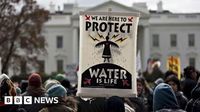Mandan, North Dakota - In a monumental ruling that reverberates through both environmental and legal circles, a North Dakota jury has found Greenpeace liable for defamation, mandating the organization to pay more than $660 million to Energy Transfer, a Texas-based oil company. The verdict, delivered after a two-day deliberation, ignites concerns over the repercussions for free speech and activism in environmental advocacy.
Energy Transfer filed the lawsuit against Greenpeace, alleging multiple infractions related to protests against the Dakota Access Pipeline (DAPL) that took place from April 2016 to February 2017. The company accused the environmental group of leading an “unlawful and violent scheme” aimed at inflicting financial harm on its operations. Throughout the trial, the defense maintained that Greenpeace had a limited role in the protests, primarily supporting peaceful, non-violent actions led by Indigenous groups, especially the Standing Rock Sioux Tribe.
At the height of the protests, which garnered national attention and international support, over 10,000 demonstrators participated, including more than 200 Native American tribes, various public figures, and thousands of activists from around the world. These protests raised alarms about the potential environmental dangers posed by the pipeline and its route through sacred land, as well as potential threats to vital water supplies.
Kelcy Warren, the co-founder and board chairman of Energy Transfer, testified during the trial, claiming that the protest movement created “a total false narrative” about the company's activities. “It was time to fight back,” he stated in a video deposition used in court. The jury's response suggests that they sided with Energy Transfer's dated concerns over disruptions caused by the protests, awarding substantial damages that Greenpeace claimed could bankrupt its operations in the United States.
Greenpeace's legal counsel has denounced the verdict, stating it threatens not only the organization but the very foundation of free speech as it pertains to activism. Deepa Padmanabha, a senior legal adviser for Greenpeace USA, emphasized this point after the ruling was delivered. “We should all be concerned about the future of the First Amendment, and lawsuits like these aimed at destroying our rights to peaceful protest and free speech,” she stated. Following the citation, Greenpeace indicated intentions to appeal the ruling.
The lawsuit alleged that Greenpeace paid professional protesters, organized training sessions, and disseminated misleading information about Energy Transfer's practices, thereby impacting the company’s reputation and financial stability. Trey Cox, representing Energy Transfer, argued in closing statements that Greenpeace's actions resulted in damages ranging from $265 million to $340 million, and he urged the jury to impose punitive damages beyond that initial calculation.
The outcome of this case has sparked widespread discussions across various platforms regarding the implications of such lawsuits on environmental activism. Observers see it as part of a larger trend of legal action aimed at silencing dissenters and potentially deterring others from challenging corporations involved in fossil fuel projects.
The demonstrations at Standing Rock were not just protests against a pipeline; they symbolized a greater fight for Indigenous rights and environmental protection. Many advocates fear the jury's decision could have a chilling effect on future activist movements. The legal mechanisms employed by Energy Transfer have raised alarm bells among free speech advocates, with many dubbing the lawsuit as a Strategic Lawsuit Against Public Participation (SLAPP).
This designation is crucial as SLAPP lawsuits are noted for aiming to intimidate critics and discourage free expression through the mechanisms of litigation. Echoing this sentiment, Kristin Casper, general counsel for Greenpeace International, affirmed their resolve to continue fighting against what they characterize as legal intimidation, promising that “Energy Transfer hasn’t heard the last of us in this fight.”
Throughout the trial, legal experts emphasized the biases inherent in this case. Many jurors had ties to the fossil fuel industry or expressed negative views of the protests, raising concerns regarding the ability of Greenpeace to receive a fair trial in North Dakota, a state with robust fossil fuel interests. Attempts by Greenpeace to relocate the trial were repeatedly denied, further complicating their defense.
The jury's ruling will likely resonate beyond North Dakota, creating ripples across the nonprofit sector and influencing how organizations engage in activism, especially those that support environmental justice causes. The findings present an essential case study for the balance between corporate interests and rights to advocacy.
The case isn't merely about a financial award; it embodies a larger ideological battle over the rights of organizations to challenge powerful corporate entities without the threat of crippling retaliatory lawsuits. The atmosphere surrounding this verdict may deter potential activists from involving themselves in causes that disrupt the status quo of heavily regulated industries and threaten their operations.
While Greenpeace is determined to contest this ruling, the outcome of their appeal will be closely monitored by activists and legal experts alike. They anticipate it could set important precedents regarding First Amendment rights in the context of environmental activism and corporate accountability.
Given the vast financial implications outlined in the jury verdict, the near future for Greenpeace in the U.S. as an activist organization hangs in the balance. Pressure mounts as they vow to continue their fight against Energy Transfer while seeking to protect their mission of environmentalism and advocacy.








